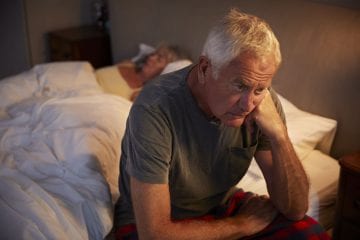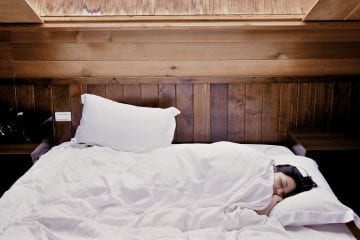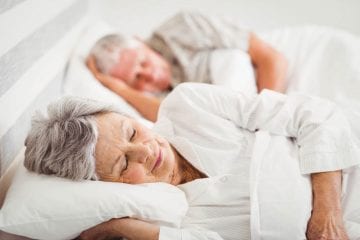Also known as sleep hyperhidrosis, night sweats are an unwanted problem associated with sleeping where the sufferer experiences persistent sweating that drenches their sheets and/or pajamas, and occurs independently in all climates and isn’t associated with environmental factors.
Table of Contents
What causes night sweats
There are a number of potential causes. Traditionally this condition is defined as persistent sweating or flushing that:
- occurs regardless of the room temperature and other environmental factors
- causes disruption to the sleeping pattern
- drenches pajamas and sheets in sweat.
When discerning between night sweats and general sweating, the first bullet point is especially important. When there’s a heatwave and our rooms are hotter than normal, we can all sweat in bed from time to time. When it occurs in all weathers, this suggests a more serious problem.
When menopause causes hot flushes and excessive sweating, this is considered authentic night sweats because there’s a medical cause. When you’re wearing pajamas during warm weather, the problem would clearly disappear with lighter clothing and a change in weather.
Not actually night sweats
To begin, let’s look at three environmental factors that can cause sweating and are of no medical concern.
Illness - As the third reason for nonthreatening night sweats, we could be a little under the weather. When ill, our body temperature tends to increase as the immune system works overtime. Just like the first two, this is a problem easily handled and will go away once you feel better.
Hot bedroom - If you have the central heating on or if heat is coming in from outside, the body expels sweat and this can disrupt sleep.
Warm bedding/clothing - You could be sweating as a result of heavy bedding and/or thick clothing. In recent years scientists have discovered that sleeping naked is actually better for us because it allows for thermoregulation. In other words, our bodies can maintain a healthy and consistent temperature through the night.
We know that the circadian cycle and thermoregulation are tied together; while our bodies are warmer in the day for energy, they cool in the evening to help sleep. Before we can sleep, our body temperature needs to drop slightly, and this is why it’s so difficult to sleep during warmer weather.
If the night sweats continue despite changing clothing, reducing the temperature, being healthy, and the weather getting colder, this may suggest an underlying issue, and this is when you should contact a medical professional.
Health conditions that cause night sweats
We’ve seen the causes that shouldn’t cause concern. Let’s look at the health conditions that drenched sheets may suggest.
Pregnancy - As we mentioned, pregnancy comes with all sorts of hormonal changes and this can manifest in strange health changes, one being night sweats. According to some sources, as many as 35% of pregnant women are affected by night sweats and they can continue after birth. Sometimes it’s a simple case of the body expelling fluid.
If you look online, you’ll find a wonderful community of parents with home remedies for night sweats. While some use cooling pads and sheets, others swear by staying hydrated and setting up a fan.
Substance abuse or withdrawal - When substances are abused on a regular basis, excessive sweating is a common concern. As we try to lose the dependence, the sweats continue and can even get worse.
If you struggle with specific substances or know somebody who does, medical attention is essential. Recovery is tough alone and the withdrawal symptoms are difficult to manage, so get the help you need and recover in a safe manner.
Neurological problems - We’re reaching the rarer causes with this one, but it’s worth mentioning since night sweats are linked to some neurological conditions. They include stroke, autonomic dysreflexia, autonomic neuropathy, and post-traumatic syringomyelia.
Infections - Night sweats are commonly recorded with HIV, tuberculosis, brucellosis, and other bacterial infections.
Medications - Night sweats are listed as a side effect of some antifever medications antidepressants, psychotropic drugs, and even chemotherapy medications.
Cancer - Sadly, cancer affects the body in a number of different ways. In the past a number of cancer patients reported night sweats as early symptoms. In particular they’re common in thyroid cancer, lymphoma, prostate cancer, and leukemia. Of course, the night sweats are accompanied by other symptoms.
Takayasu’s arteritis - Causing inflammation and damage in the blood vessels, this is another disorder that remains a mystery to doctors. We know that it’s probably an autoimmune disease and that infections trigger the disorder, but we aren’t sure why.
As soon as the immune system recognizes danger, it has several tools to attack and temperature regulation is one of them. This is useful, but it also causes problems with health conditions such as night sweats and fever.
Idiopathic hyperhidrosis - Affecting a little under 3% of Americans, idiopathic hyperhidrosis is often diagnosed when all other avenues have been exhausted because it literally describes chronic sweating with no explanation.
Hypoglycemia - Also considered low blood sugar, one side effect of hypoglycemia are night sweats. For those who rely on insulin during the day blood sugar can drop through the night which causes sweating.
Gastroesophageal Reflux Disease (GERD) - You might associate GERD with heartburn, but some sufferers also experience night sweats. As we lie down, stomach acid travels up to the esophagus and damages the tissue, and also causes sweating as we wake. Fortunately management of this disease has dramatically improved. If it does occur, a simple solution is to buy a wedge pillow to elevate your torso and prevent acid from travelling up the body.
Anxiety - As time goes on, we’re learning more about anxiety and this includes its impact on sleep. People with disorders have what’s called a chronically activated nervous system. As well as the mental and emotional effects of anxiety, this leads to flushes and night sweats. In control of the bodily processes the vagus nerve is to blame - this also controls heart rate, temperature, and digestion.
Sleep apnea - Stopping breathing during sleep, obstructive sleep apnea is a scary health concern, especially when it leads to gasping and choking in the middle of the night. Luckily these days we have access to BIPAP and CPAP machines which monitor and control breathing as we sleep.
However, when the problem isn’t diagnosed or handled effectively, it has the potential to cause sweating. For many years researchers have been looking for a reason for this, but we’re still none the wiser. As a best guess, oxygen deprivation causes a spike in blood pressure which then results in sweating.
Obesity - People carrying extra weight will also have problems since thermoregulation becomes difficult. Obesity also increases the risk of obstructive sleep apnea and this can cause night sweats and many other sleep related issues.
Hormonal imbalances - You may have a hormonal imbalance or disorder causing flushing and sweating. If you’ve experienced pregnancy, this is probably something you recognize. Elsewhere sweating can arise from the carcinoid syndrome, hyperthyroidism, and pheochromocytoma.
Menopause - Women going through menopause may experience night sweats. As hormonal levels fluctuate, this can cause hot flushes and higher body temperature and adrenaline. Not only does this soak the sheets, it wakes the sleeper up and makes them feel uncomfortable.
How to stop (or reduce) night sweats
Now we understand night sweats and the different ways that they form. So how do we deal with them?
First things first, it’s important to distinguish between medical and other causes. If the sweating continues despite the changing environment and getting over an illness, this suggests a deeper problem. After contacting a doctor and receiving treatment for a problem there may be steps you can take to make the sweats either less frequent or less intense.
Use your bedside table - As well as drinking some cold water before bed, keep some cooling items on the bedside table - an ice pack, ice cubes, a cooling spray, or even a damp towel.
Lose alcohol - Alcohol can certainly make us feel tired, but the effects will eventually wear off and your body will react with a jump in temperature. Suddenly you’ll be awake and facing another night of sweating. Of course, there’s also the risk of alcohol dependence (and unhealthy side effects).
Avoid spicy foods - Spicy foods not only taste hot, but can also heat up our bodies, so avoid them in the hours before bed.
Diet and exercise - Failing all of these solutions, you could go back to basics and introduce a healthy diet with a solid exercise program. Whenever we carry extra weight, it can affect our thermoregulation. With a good diet and exercise you can keep healthy and also limit stress.
Manage stress - Easier said than done, but you’ll be surprised how close the relationship is between stress and sleep. When stress strikes, our nervous system takes the hit. As it goes into overdrive, our body temperature increases to meet the incoming physical threat.
Try to take breaks from work and other stressful situations throughout the day. Find what helps you relax, be it music, yoga, or writing your thoughts in a diary.
Use a cooling mattress - Did you know that there are special mattresses that sleep cooler than most others? While a memory foam mattress might conform to the body, it also retains body heat. In our experience innerspring and latex mattresses are the best options alongside any hybrid bed that has cooling layers built in. As heat distributes more efficiently, you can sleep in comfort and hopefully stave off night sweats.
If you want to go all the way, look into cooling mattress toppers, cooling pads, and even cooling pillows.
Limit bedding - As you lose the pajamas, try to reduce the amount of bedding you use too. Go down to the minimum, and then look for breathable cotton or linen for your sheets.
Sleep naked - It makes sense that taking off layers reduces the intensity of sweating, right? As we mentioned earlier, scientists also advise sleeping naked to avoid getting too hot or too cold while sleeping.
Buy a fan - Simply put, a fan will decrease the temperature in your bedroom and reduce the likelihood of night sweats.
Reduce room temperature - If you can keep your room around 65 degrees Fahrenheit, you’ll create the perfect environment for sleep. If a health condition keeps you hotter than normal, go a few degrees lower.
When it’s time to see a doctor
In many cases people are able to help themselves with our advice and night sweats disappear. If you’ve tried several of these tips and there’s no improvement, it’s time to contact a doctor. Assuming that there’s no heatwave and you aren’t sleeping in a coat, they will run tests and ask questions to identify the underlying issue.
In preparation for your appointment we recommend keeping a diary of all occurrences of night sweats. With information about your diet, sleep schedule, night sweats, and exercise routines the doctor will have everything s/he needs to start working towards a solution. With luck you’ll soon have a treatment plan and be able to say that night sweats are a thing of the past!



